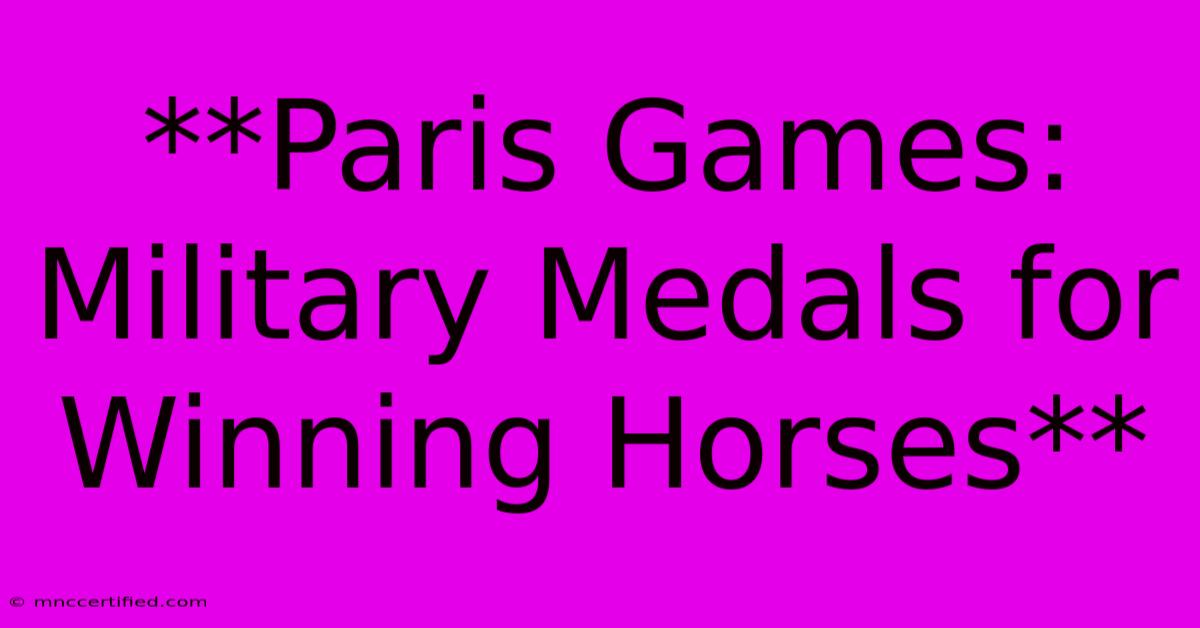**Paris Games: Military Medals For Winning Horses**

Table of Contents
Paris Games: Military Medals for Winning Horses? A Look at the Quirky History of Olympic Equestrianism
The Paris Games are almost here, and excitement for the Olympic equestrian events is building. While modern audiences might be captivated by the grace and athleticism of horses and riders, there's a fascinating historical twist that adds a touch of intrigue to the competition: military medals.
A Legacy of War and Glory:
For much of Olympic history, equestrianism was deeply intertwined with military traditions. The sport was seen as a crucial test of a nation's military prowess, and the medals awarded reflected this.
During the early years of the Olympics, from 1900 to 1912, military medals were actually given to winning horses. This might seem surprising today, but it underscores the importance placed on horsemanship in those times.
Beyond the Battlefield: The Evolution of Equestrianism
As the Olympics evolved, so did the perception of equestrian sports. While military skills were still valued, the emphasis shifted towards athleticism, horsemanship, and the partnership between rider and horse.
The 1912 Olympic Games in Stockholm marked a significant shift, with medals being awarded to riders rather than their steeds. This marked the beginning of a new era in equestrianism, one that focused on athleticism and sportsmanship, while still recognizing the vital role of the horse.
Modern Equestrianism: A Test of Skill and Partnership
Today, equestrian events at the Olympics are recognized for their technicality, athleticism, and the remarkable bond between rider and horse. Disciplines like dressage, show jumping, and eventing demand precision, strength, and an intuitive connection between athlete and animal.
The Paris Games 2024 will undoubtedly showcase the pinnacle of equestrian sports, highlighting the skill, dedication, and athleticism of both horse and rider. While the days of military medals for horses are long gone, the legacy of equestrianism's military past continues to influence the sport's unique blend of athleticism and tradition.
SEO Tips for Your Blog Post
By using keywords strategically, you can ensure your blog post ranks well in search results. Here are some tips to consider:
- Target Keywords: "Paris Games," "Olympic equestrianism," "equestrian history," "military medals," "dressage," "show jumping," "eventing," "horse riding."
- Keyword Density: Use keywords naturally throughout the post. Aim for a density of 1-2% to avoid keyword stuffing.
- Long-Tail Keywords: Incorporate long-tail keywords for better targeting, such as "Paris Games equestrian events," "history of Olympic equestrianism," or "military medals for winning horses."
- Internal and External Linking: Link to relevant content on your website and to reputable sources, such as official Olympic websites or equestrian organizations.
- Image Optimization: Use high-quality images relevant to your content and optimize them with alt text using keywords.
By implementing these tips, you can improve your blog post's visibility, attract more readers, and establish your expertise in equestrian history and the Paris Games.

Thank you for visiting our website wich cover about **Paris Games: Military Medals For Winning Horses** . We hope the information provided has been useful to you. Feel free to contact us if you have any questions or need further assistance. See you next time and dont miss to bookmark.
Featured Posts
-
Hearts Lose To Heidenheim In Spfl Game
Nov 09, 2024
-
Grammy Awards 2025 Nomination Announcement
Nov 09, 2024
-
Which Dividend Option Would An Insurer
Nov 09, 2024
-
Van Der Beek Early Colon Cancer Symptoms Ignored
Nov 09, 2024
-
Unified Minds Pokemon Trading Card Game
Nov 09, 2024